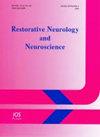联合给药l -精氨酸和omega-3多不饱和脂肪酸对次全脑缺血大鼠下丘脑游离氨基酸和生物原胺谱的影响
IF 1.6
4区 医学
Q4 NEUROSCIENCES
引用次数: 0
摘要
本研究的目的是研究大鼠脑次全缺血(SCI)后,经l -精氨酸和omega-3多不饱和脂肪酸(PUFA)处理后海马中游离氨基酸及其衍生物池的变化。实验以18只大鼠为实验对象,其中12只为双侧动脉颈动脉细丝闭塞,6只给予l -精氨酸和omega-3 PUFA。药物omega-3 PUFA“Omegamed”(剂量为5 g/kg体重)在模拟SIMG前一周内灌胃。在结扎颈总动脉前静脉注射l -精氨酸(剂量为100 mg/kg体重)。采用反相高效液相色谱法分析血浆提取物中游离氨基酸及其衍生物的含量。SIGM大鼠海马组织中组氨酸、3-甲基组氨酸、谷氨酰胺、α-氨基丁酸、异亮氨酸、亮氨酸、缬氨酸水平升高,苏氨酸、酪氨酸、α-氨基己二酸水平降低。l -精氨酸和omega-3 PUFAs可以防止缺血引起的苏氨酸、组氨酸、谷氨酰胺、α-氨基丁酸、α-氨基己二酸水平的破坏,并且对海马的血清素系统也有纠正作用。本文章由计算机程序翻译,如有差异,请以英文原文为准。
The effect of combaine administration of L-arginine and omega-3 polyunsaturated fatty acids on the spectrum of free amino acids and biogen amines in hyppocampus of rats undergoing subtotal cerebral ischemia
The aim of this study was to estimate the changes in the pool of free amino acids and their derivatives in hippocampus of rats undergoing subtotal cerebral ischemia (SCI) and treated with L-arginine and omega-3 polyunsaturated fatty acids (PUFA). Experiment was held on 18 rats: 12 animals were undergoing bilateral filament occlusion of arteries carotid, 6 of them L-arginine and omega-3 PUFA was administrated. The drug omega-3 PUFA "Omegamed" (at a dose of 5 g/kg of body weight) was injected intragastrically during the week preceding the simulation of SIMG. L-arginine (at a dose of 100 mg/kg body weight) was injected intravenously just before ligation of the common carotid arteries. The analyses of free amino acids and their derivates levels in the blood plasma extracts were carried out by reversed phase HPLC. In the hippocampus of rats with SIGM, there was an increase in the levels of histidine, 3-methylhistidine, glutamine, α--aminobutyrate, isoleucine, leucine, valine, as well as a decrease in the levels of threonine, tyrosine, and α--aminoadipic acid. Administration of L-arginine and omega-3 PUFAs prevented ischemia-induced disruption of threonine, histidine, glutamine, α--aminobutyrate, α--aminoadipic acid levels, and also had a corrective effect on the serotonin system of the hippocampus.
求助全文
通过发布文献求助,成功后即可免费获取论文全文。
去求助
来源期刊
CiteScore
5.40
自引率
3.60%
发文量
22
审稿时长
>12 weeks
期刊介绍:
This interdisciplinary journal publishes papers relating to the plasticity and response of the nervous system to accidental or experimental injuries and their interventions, transplantation, neurodegenerative disorders and experimental strategies to improve regeneration or functional recovery and rehabilitation. Experimental and clinical research papers adopting fresh conceptual approaches are encouraged. The overriding criteria for publication are novelty, significant experimental or clinical relevance and interest to a multidisciplinary audience. Experiments on un-anesthetized animals should conform with the standards for the use of laboratory animals as established by the Institute of Laboratory Animal Resources, US National Academy of Sciences. Experiments in which paralytic agents are used must be justified. Patient identity should be concealed. All manuscripts are sent out for blind peer review to editorial board members or outside reviewers. Restorative Neurology and Neuroscience is a member of Neuroscience Peer Review Consortium.

 求助内容:
求助内容: 应助结果提醒方式:
应助结果提醒方式:


